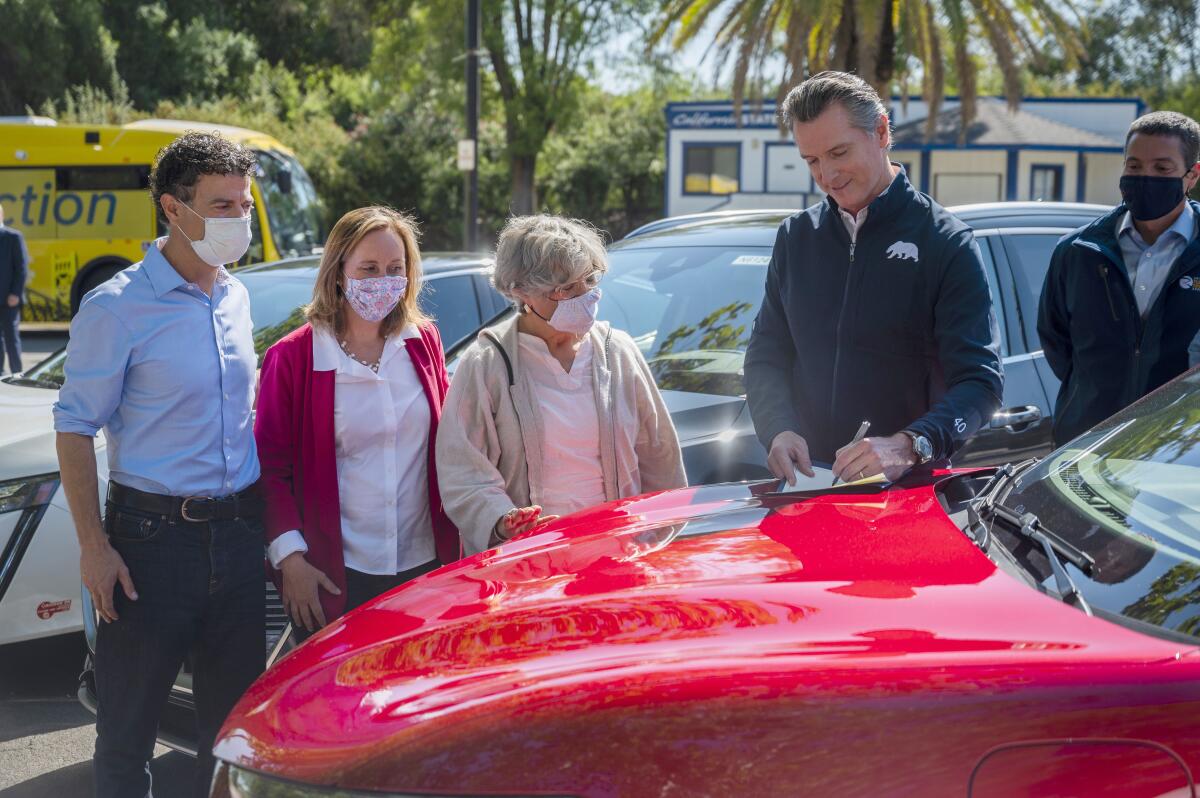Editorial: For the sake of the planet, don’t remove California’s governor

Just how important is California in the fight against climate change?
California was the first state in the nation to place a limit on carbon emissions, setting an example that was followed by other states and other countries. When state lawmakers here committed to reaching 100% renewable energy by 2045, more than a dozen states did the same. After California began requiring that automakers sell a certain percentage of zero-emission vehicles, more than 10 states adopted the mandate as well.
California filled the void when then-President Trump and Congress retreated into their cave of climate denialism, with Gov. Jerry Brown traveling to China to discuss carbon-cutting strategies directly with President Xi Jinping. When Trump rolled back the nation’s commitment to cutting greenhouse gas emissions from new cars, California made a deal with four leading automakers to keep producing cleaner cars anyway.
Time and time again, California used its power as the world’s fifth-largest economy to lead with policies and programs designed to slash greenhouse gas emissions and phase out fossil fuel combustion. Why? Because voters and the lawmakers we elect recognize the existential threat posed by a warming planet. We can see it. We can feel it. And we have chosen to embrace the power of collective action in trying to prevent greater devastation.
That’s why, for voters who care about the future of the planet — and survey after survey suggests that’s the vast majority of Californians — this Sept. 14 recall election is a make-or-break moment.
With Newsom, California will continue to aggressively press forward toward a cleaner, fossil-fuel-free future with policies that drive investments and innovations that will help the world fight climate change. The leading candidates to replace Newsom would almost certainly slow the state’s ambitious efforts. In the worst-case scenario, a Gov. Larry Elder or Gov. John Cox would reverse California’s progress.
Forget about cutting greenhouse gas emissions, Elder and Cox said they wanted to double down on fossil fuels. “I would want more fracking, not less,” Elder told the Los Angeles Times Editorial Board. Why is that so bad? The United States’ boom in fracking to extract oil and gas has been linked to higher methane concentrations in the global atmosphere.
Methane is a potent greenhouse gas that has often been overlooked compared with carbon dioxide. But the recent dire report from the United Nations Intergovernmental Panel on Climate Change makes the case that slashing methane emissions could be the fastest way to slow global warming. So, increasing fracking would be like spraying lighter fluid on a burning building. It’s the opposite of what California should be doing.
Cox, meanwhile, wants California to ramp up natural gas production and ship it across the globe. “Californians want to do something about global pollution and climate change, right? What’s a better way to deal with that than to produce cheap, available natural gas that would replace the coal that is burned by China and India,” Cox argued.
That’s the argument of the U.S. oil and gas industry. But it ignores the effects of all the emissions created by extracting and transporting gas in massive ships across oceans. When the full process is taken into account, the climate footprint of U.S.-produced liquefied natural gas is “only modestly smaller than that of other fossil fuels,” according to a Natural Resources Defense Council analysis from last year.
Rather than look back at fossil fuels, California should continue to look forward at zero-emission technology. In fact, electric vehicles were the state’s most valuable export in 2020. And it’s not just Teslas. California has become a center of electric car, bus and truck manufacturing, thanks to government regulations and incentives that encouraged the nascent market to grow here.
But according to Newsom’s challengers, California’s clean-car and clean-energy innovations had nothing to do with regulations or government intervention. (Most, for example, oppose Newsom’s executive order to end the sale of new gasoline-powered cars by 2035.)
“You know, the reason the solar is being adopted a lot more here and across the country has nothing to do with what bureaucrats and politicians in Sacramento are doing,” Assemblyman Kevin Kiley told the editorial board. “It has to do with the economics of it, and the fact that we’re continuing to innovate and coming up with storage in a way that makes that energy source practical.”
That’s not what the energy industry experts say. Take energy storage, which can hold renewable power until it’s needed for use. Most utilities weren’t willing to invest in energy storage until state lawmakers passed a bill that resulted in the nation’s first energy storage target for the state’s three investor-owned utilities, said Janice Lin, co-founder of the California Energy Storage Alliance.
“Sometimes you need leadership and legislation to say, ‘This is what we’re going to do,’” Lin said.
At least the other Kevins in the race recognize the vital role that government plays in driving climate solutions. YouTube personality Kevin Paffrath wants state government to build the infrastructure to support hydrogen vehicles, an idea that has had limited success in California. Former San Diego Mayor Kevin Faulconer committed that city to 100% renewable energy and a 50% reduction in greenhouse gas emissions by 2035 as part of the city’s Climate Action Plan. Faulconer said he rejects Newsom’s zero-emission vehicle mandate. Rather, he wants the state to encourage (but not require!) cities to build more homes near transit. That’s a fine idea but one cities have been slow to embrace.
It’s clear that the world has moved too slowly to stop global warming and the increase in extreme and deadly weather events. California is too important to this fight to cede the state’s leadership. For the sake of the planet, vote no on the recall.
More to Read
A cure for the common opinion
Get thought-provoking perspectives with our weekly newsletter.
You may occasionally receive promotional content from the Los Angeles Times.









